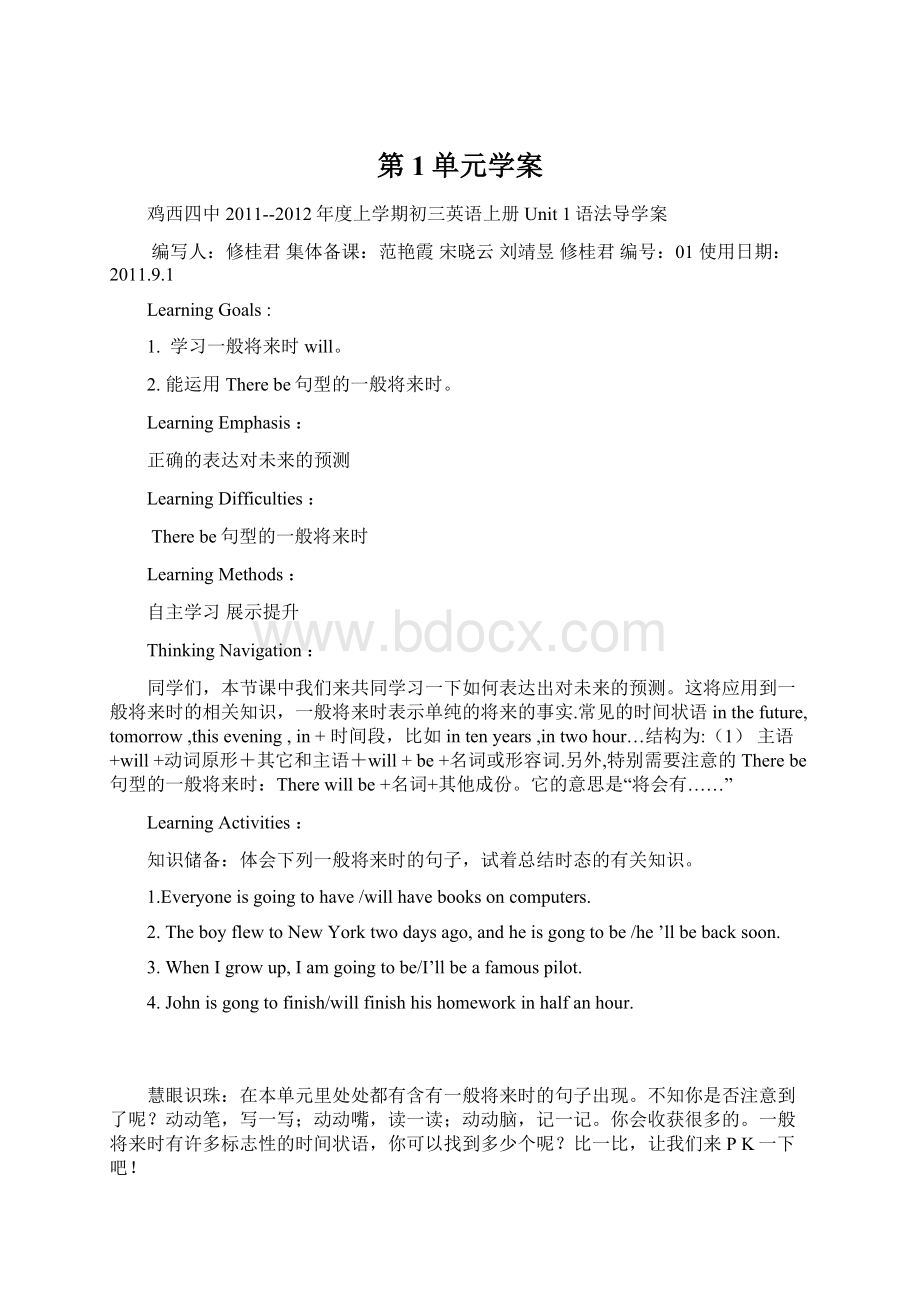第1单元学案.docx
《第1单元学案.docx》由会员分享,可在线阅读,更多相关《第1单元学案.docx(17页珍藏版)》请在冰豆网上搜索。

第1单元学案
鸡西四中2011--2012年度上学期初三英语上册Unit1语法导学案
编写人:
修桂君集体备课:
范艳霞宋晓云刘靖昱修桂君编号:
01使用日期:
2011.9.1
LearningGoals:
1. 学习一般将来时will。
2.能运用Therebe句型的一般将来时。
LearningEmphasis:
正确的表达对未来的预测
LearningDifficulties:
Therebe句型的一般将来时
LearningMethods:
自主学习展示提升
ThinkingNavigation:
同学们,本节课中我们来共同学习一下如何表达出对未来的预测。
这将应用到一般将来时的相关知识,一般将来时表示单纯的将来的事实.常见的时间状语inthefuture,tomorrow,thisevening,in+时间段,比如intenyears,intwohour…结构为:
(1)主语+will+动词原形+其它和主语+will+be+名词或形容词.另外,特别需要注意的Therebe句型的一般将来时:
Therewillbe+名词+其他成份。
它的意思是“将会有……”
LearningActivities:
知识储备:
体会下列一般将来时的句子,试着总结时态的有关知识。
1.Everyoneisgoingtohave/willhavebooksoncomputers.
2.TheboyflewtoNewYorktwodaysago,andheisgongtobe/he’llbebacksoon.
3.WhenIgrowup,Iamgoingtobe/I’llbeafamouspilot.
4.Johnisgongtofinish/willfinishhishomeworkinhalfanhour.
慧眼识珠:
在本单元里处处都有含有一般将来时的句子出现。
不知你是否注意到了呢?
动动笔,写一写;动动嘴,读一读;动动脑,记一记。
你会收获很多的。
一般将来时有许多标志性的时间状语,你可以找到多少个呢?
比一比,让我们来PK一下吧!
3.观察运用平台(小组合作练习)
观察你身边的事务,创作出含有一般将来时的句子。
学法指导:
请注意Therebe句型的一般将来时
Demonstration:
1.问题梳理:
学法指导:
在自学与交流中,大家还会有不懂或表达不清的地方,请把你不会的问题写在下面。
2.成果展示会;展示小组的风采。
你强我更强。
Examination
(一)基础题
一、选择
()1.I_________rocketstothemoonwhenIgrowup.
A.willputB.willflyC.willtakeD.willbefly
()2.Ifthereare_________trees,theairinourcitywillbe_________cleaner.
A.less;moreB.more;moreC.more;muchD.much;more
()3.Ipredicthewillbeanengineer_________tenyearsbecauseheissointerestedinmakingthings.
A.inB.afterC.laterD.for
()4.Thereis_________meatbut_________cakesontheplate.Pleasehaveone.
A.alittle;afewB.afew;alittleC.few;littleD.little;afew
()5.whatdoyouthink________intenyears?
A.willSallybeB.SallywillbeC.isSallybe
(二)能力提升
二、按要求改写下列句子,每空一词。
1.Theycleantheclassroomeveryday.(用tomorrow代替everyday)
They__________________theclassroomtomorrow.
2.Willtheflowerscomeoutsoon?
(作肯定回答)_________,__________________.
3.We'llgooutforawalkwithyou.(改为否定句)
We__________________outforawalkwithyou.
4.Tonghuawillhaveafineday.(改为一般疑问句)
_________Tonghua_________afineday?
5.Thestudentswillworkinthesupermarket.(对划线部分提问)
__________________thestudents_________?
(三)中考链接
()1.We’lltryourbesttodotheworkwith_____moneyand_____people.(上海,2008)
A.few,littleB.afew,alittleC.less,fewerD.fewer,less
()2.There_____asportsmeetingnextweek.(辽宁。
2009)
A.isB.areC.willhaveD.willbe
()3.There____anEnglishspeechcontesttomorrowafternooninourschool.
A.willhaveB.willisC.isgoingtohaveD.willbe
()4.IntenyearsJoe_____anastronaut.
A.isB.wasC.willisD.willbe
鸡西四中2011--2012年度上学期初三英语上册Unit1对话导学案
编写人:
修桂君集体备课:
范艳霞宋晓云刘靖昱修桂君编号:
02使用日期:
2011.9.2
LearningGoals:
1. 识记单词:
学会使用表达数量。
2.熟练运用一般将来时谈论自己对未来的预测。
3.通过时间对比复习一般过去时态、一般现在时态,巩固一般将来时.
LearningEmphasis:
运用一般将来时谈论自己对未来的预测。
LearningDifficulties:
Therebe句型的一般将来时
LearningMethods:
自主学习展示提升
ThinkingNavigation:
同学们,本节课中我们将以对话的形式通过时间对比复习一般过去时态、一般现在时态,巩固一般将来时.
LearningActivities:
Self-study
知识储备:
一.写出下列单词的三种形式(过去,三单,将来)
1.fall
2.study
3.sit
4.write
二.通过习题,学会使用形容词比较级表达数量
1.I hope I have ______free time. I don’t like to keep busy.
A. more B. less C. many D. Much
2.If there are ____trees, the air in our city will be ___ cleaner
A. less; more B. more; more C. more; much D. much; more
3.IamhappybecauseIhavehomeworktodotodaythanyesterday.
A. more B. less C. few D. fewer
观察运用平台:
小组合作创作出含有一般将来时的句子,谈论自己对未来的预测。
学法指导:
请注意Therebe句型的一般将来时
Demonstration:
1.问题梳理:
学法指导:
在自学与交流中,大家还会有不懂或表达不清的地方,请把你不会的问题写在下面。
2.成果展示会;展示小组的风采。
你强我更强。
Examination
A.基础训练
I、填写正确的单词
1.Thesedayseveryoneu__________computerstodoalotofthings.
2.Idon’tawithhim.
3.Therearealotofbinourcity.
4.Ihopetherewillbemorertoworkforusinthefuture.
5.We’llhavemoref__________timetoplaysports.
6.Thestudentshopeteacherswillgivethem________(少)homeworkthanlastterm.
7.Ourcitiesare________(更拥挤)thanbefore,Ihopethereare________(少)carsinthestreet.
B.能力提升
II、用所给词的正确形式填空.
1.Therearemanynew_________(build)inourcity.
2.Wecandotheworkwith_________(little)moneyand________(few)peoplethantheycan.
3.Maybehewantstogo_________(skate).
4.Thereare_________(hundred)ofpeopleontheground.
5.There_______(not)beanypaperbooks.Everyonewillhavebooksoncomputers.
6.WheredoyouthinkSally_____________(work)tenyearsfromnow?
7.Theboy__________(fly)toNewYorktwodaysago,andhe’llbebacksoon.
8.____(be)youatschoolyesterdayevening?
Wehadanexcitingparty.
9.--WhereisMr.Lu?
--I’mnotsure.______he_______(write)inhisoffice?
10.WhenIgrowup,I_______________(be)afamouspilot.
C.中考链接
III.选择
1.Heishappythathe__________inatallapartmentnextyear.
A.liveB.livesC.willlive
2.--Willtherebemorepeoplein100years,doyouthink?
--__________,Ihope.
A.No,thereisn'tB.No,therearen'tC.No,therewon't
3.IhopeIhave________freetime.Idon'tliketokeepbusy.A.moreB.LessC.many
4.Hethinks__________willbedifficultforarobottodothesamethingsthatpeoplecando.
A.thisB.thatC.thatitD.itthat
5.--Doyoulikethecitylifeorthecountrylife?
--It'shardtosay.Inthecitythereis__________entertainment,butinthecountrythereis__________pollution.A.less;moreB.more;lessC.more;fewer
6.Mylifewillbe__________betterthanitisnow.
A.alotB.alotofC.afew
7.Scientistsinsomecompaniesaretryingtomakerobot________people,anddothesamethings__________.
A.looklike;asusB.lookslike;asours
C.lookas;likeusD.looksas;likeours
8.--When_____you______toAustralia?
--NextMonday.
A.did,fly B.will,fly C.are,fly D.do,fly
鸡西四中2011--2012年度上学期初三英语上册Unit1阅读导学案
编写人:
修桂君集体备课:
范艳霞宋晓云刘靖昱修桂君编号:
03使用日期:
2011.9.2
LearningGoals:
1.通过阅读短文,掌握文中出现的短语并能翻译全文。
2.熟练运用所学词汇和句型复习巩固一般将来时。
3.培养学生阅读能力和解决实际问题的能力。
LearningEmphasis:
运用一般将来时谈论自己对未来的预测。
LearningDifficulties:
Therebe句型的一般将来时
LearningMethods:
自主学习展示提升
ThinkingNavigation:
同学们,本节课中我们将以对话的形式通过时间对比复习一般过去时态、一般现在时态,巩固一般将来时.
LearningActivities:
Self-study
知识储备:
一.写出下列短语
1.太空站___________2.飞行__________3.take过去式__________4.fall过去式________
5.爱上____________________6.单独__________7.有能力做某事________________
8.去滑冰___________9.write过去式_____
二.通过习题,体会alone和lonely的区别
1.Ifeelathome,Ihavenofriends.
2.Shelivesinthemountain.
慧眼识珠:
在本单元里的短文中处处都有含有重要的知识点。
不知你是否注意到了呢?
动动笔,写一写;动动嘴,读一读;动动脑,记一记。
你会收获很多的。
你可以找到多少个呢?
比一比,让我们来PK一下吧!
Demonstration:
1.问题梳理:
学法指导:
在自学与交流中,大家还会有不懂或表达不清的地方,请把你不会的问题写在下面。
2.成果展示会;展示小组的风采。
你强我更强。
Examination
A.基础训练
一、根据汉语提示完成句子
1.Nooneknowswhatwillhappen(在将来).
2.LastyearI_______________Shanghai.(爱上了)
3.Ilikelivingwithfriends,Idon’tlike_________(独自居住)
4.Attheweekends,I’llbeableto________________.(穿着随便些)
5.I______________apetcat.(甚至可能饲养)
B.能力提升
二、选择题
()1.Iwillseeyouagain_________.
A.adayB.everydayC.onedayD.everyday
()2.Intenyears,John_______anastronaut.
A.is B.willbe C.was D.will
()3.Howmanypeople_______therefiftyyearsago?
A.will B.were C.are D.willbe
()4.Thiscoatdoesn'tfithimwell,ashehas_____ahugebodyandthecoatis______small.
A.so;suchB.so;soC.such;suchD.such;so
()5.Thereis_______meatbut_______cakesontheplate.Pleasehaveone.
A.alittle;afew B.afew;alittle C.few;littleD.little;afew
()6.—Whatisyourfavorite21stcenturyprediction?
—Ipredicttherewillbe_______freetime.
A.many B.few C.fewer D.less
()7.—Howmanybirdscanyouseeinthetrees?
—Icansee_________birdsinthem.
A.hundredsofB.fivehundredsC.hundredofD.fivehundredsof
C.中考链接
三、补全对话:
A:
Doyouthinkpeoplewillhaverobotsintheirhomesin100years?
B:
Yes,Ido.1
A:
Well,Idon’tthinkpeoplewillusemoney.
B:
2
A:
Yeah,probably.
B:
Ithinktherewillbeonlyonecountry.
A:
Onlyonecountryintheworld?
Willtherebeworldpeace?
B:
Ihopeso.
A:
Ibetkidswon’tgotoschool.3
B:
Oh,Idisagree.
A:
Youdo?
B:
4
1.2..3..4..
A. They’llstudyathomeoncomputers..
B. Yeah,therewillalwaysbeschools.
C. Doyouthinkeverythingwillbefree?
D. IsawarobotonTV,anditcleanedthekitchen.
Unit1Willpeoplehaverobots?
单元要点总结
1. 一般将来时
1)由“will/shall+动词原形”构成的一般将来时。
系动词am,is,are的原形都是be。
如:
Itwillbeveryhottomorrow.明天会非常热。
shall适用于第一人称I,we;will适用于所有人称,通常可以用will来代替shall。
will,shall均可以缩写为'll,如Iwill=I'll;shewill=she'll
一般将来时的否定句是在will或shall之后加上not。
willnot可以缩写为won't;而shallnot可以缩为成:
shan't。
2)与一般将来时连用的时间状语,它们通常是一些表示将来时间的词或词组。
例如:
tomorrow(明天)beforelong(不久)thedayaftertomorrow(后天)
nextweek(下周)soon(很快)inthefuture(将来)inthreedays(三天后)
someday(将来的某一天)
2.含一般将来时句子的疑问句
1)一般疑问句只需把will或shall提到主语前面即句首,并大写首字母就可以了。
如:
WillyouleaveforBeijingnextweek?
变成特殊疑问句的时候,通常结构是:
特殊疑问词+一般疑问句的语序。
也就是:
疑问词+will+主语+动词原形+其他成分。
如果是对主语提问,则主语部分就不在句子中出现。
如:
WhenwillyouleaveforBeijing?
2)Therebe句型的一般将来时:
Therewillbe+名词+其他成份。
它的意思是“将会有……”如:
Therewillbefewercars.汽车会更少。
要点总结1-2
3.1)形容词more、fewer和less的用法。
more的意思是“更多的”,它是many和much的比较级,它可以用来修饰可数名词的复数或者不可数名词;
fewer意思是“更少的”,它是few的比较级,它只能用来修饰可数名词的复数。
less意思也是“更少的”,